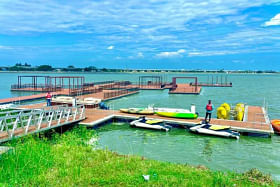With nearly 92 per cent of the work complete, and the remaining due to conclude by September, the revival of these lakes symbolises the transformational power of smart city initiatives.
In the heart of Coimbatore, a city known as the “Manchester of South India,” a remarkable transformation is underway—one that unfolds like a captivating story of resilience, innovation, and nature’s reclamation.
Coimbatore City Municipal Corporation embraced the Smart Cities Mission program for the eco-restoration of seven historic city lakes.
Coimbatore, the second-largest city in Tamil Nadu, has woven together its historical legacy, ecological balance, and modern aspirations in a symphony of revival.
Historic Significance of Lakes: A Lost Legacy Rediscovered
Delving into history, during the Kongu Chola dynasty of the 8th and 9th centuries, an intricate network of 30 lakes and ponds emerged across the Noyyal River basin.
These interconnected water bodies, along with their canals and rivulets, doubled as flood buffers. They harnessed monsoons, protecting the region while replenishing groundwater. This system played a vital role in boosting agricultural productivity, directly irrigating around 20,000 acres of fertile land. These lakes are interwoven with the tapestry of human history and the environment.
With time, these water bodies, once teeming with life, began facing challenges. Over time, many lakes filled up, leaving Coimbatore with 24 in the Noyyal River basin. Anthropogenic pressures and threats mounted, leading to a decline in these man-made wetlands.
Despite Coimbatore’s emergence as one of Tamil Nadu’s first Smart Cities, its lakes faced a paradox – a prosperous city grappling with dying water bodies.
The Smart City Solution
Embarking on its journey in 2017, this revival of seven lakes, including Periyakulam, aimed not only at ecological restoration but also at creating vibrant spaces for recreation and community engagement amid the city’s rapid expansion.
With an investment of around Rs 350 crore, the initiative sought to revive ecological harmony while crafting sprawling recreational areas. Coimbatore’s Municipal Commissioner and CEO of Coimbatore Smart City, M Prathap remarked, “Cleaning and rejuvenation of this cascading system of lakes is the biggest project under the Coimbatore Smart City.”
“ Work on it began in 2017 and we picked up the revival of these seven lakes as a major and ambitious project under the smart city to not only rejuvenate the natural ecosystem but also create more recreational spaces in this fast-developing city,” added M Prathap, reports Print.
Seven Lakes Project
The seven lakes taken up under the Smart City project are – Periyakulam Lake, Krishnampathy Lake, Selvampathy Lake, Kumaraswamy Lake, Selvachinthamani Lake, Valankulam Lake and Kurichikulam Lake.
The lakes are situated North of the Noyyal River valley, which are fed by canals from overflow weirs constructed on River Noyyal and also storm-water streams which originate in the Western Ghats situated further north of the Noyyal basin.
Seven Lakes Project (Twitter)
Periyakulam Lake (Area: 337 acres)
Periyakulam Lake, the biggest lake in Coimbatore, is part of the cascading system of about 30 lakes.
Periyakulam lakefront, particularly, has been decked up with artworks, and cycle tracks and amphitheatres have been provided for cultural activities, with a cost of Rs 101 crore.
The revived lakes now host vibrant activities like boating, jet skiing, and cycling, attracting migratory birds. Periyakulam Lake, once shrouded in hyacinth and odour, has now transformed into a haven for families and individuals seeking leisure.
Periyakulam Lake (K.Radhakrishnan/ Twitter)Periyakulam cycling track (K.Radhakrishnan/ Twitter)
Kurichikulam Lake (335 acres)
Kurichikulam Lake (K.Radhakrishnan/ Twitter)(K.Radhakrishnan/ Twitter)
Valankulam Lake (Area: 160 acres)
Valankulam Lake (Oasis)Vankulam lake before and after restoration image (Oasis)Valankulam Lake (K.Radhakrishnan/ Twitter)(K.Radhakrishnan/ Twitter)
Kumarasamy Lake (Area: 71.7 acres)
Kumarasamy Lake (K.Radhakrishnan/ Twitter)
Selva Chinthamani Lake (Area: 35.22 acres)
Selva Chinthamani Lake (K.Radhakrishnan/ Twitter)
Krishnampathy Lake (Area: 61 acres)
Krishnampathy Lake (Twitter)
The rejuvenation of these lakes breathes new life into Coimbatore’s urban fabric. The Coimbatore Smart City initiative has not only restored nature’s balance but also enriched citizens’ lives.
With nearly 92 per cent of the work completed, and the remaining due to conclude by September, the revival of these lakes symbolises the transformational power of smart city initiatives.
Baskar Srinivasan, General Manager, Coimbatore Smart City, said the rejuvenation of the lakes in the river Noyyal basin, has also attracted migratory birds to these water bodies, as per PTI report.
The per capita public space availability in Coimbatore city was estimated to be 2.17 sqm before the commencement of smart city projects in 2017. According to World Health Organisation (WHO) standards, 9 sqm per capita open space is expected to be provided in urban areas.
Due to the smart city lake projects, per capita availability of public space has increased to 4.9 sqm from 2.17 sqm, according to data shared by the Coimbatore Smart City Limited (CSCL).
“All illegal encroachment on the seven lake fronts (20,389 dwellings) have been completely removed over the past decade. Nearly 28 acres of land has been retrieved and brought to public use. The number of households rehabilitated and provided tenements with security of tenure stands at 7,680 under the Smart City Mission,” the CSCL said.
Coimbatore Smart City CEO hopes that revival of the lakes and starting of recreation activities around it will also help boost tourism in the city.
“Most people use Coimbatore as a transit city like going to Isha Foundation campus. But, we want tourists to spend at least a night in our city and see places in Coimbatore city too,” he added.
Way Forward
Despite the impressive makeover, there are still some issues that need fixing. Coimbatore’s improved lakes face ongoing problems that need attention. These include mixing sewage with clean water, keeping things well-maintained, people building in the wrong places, taking care of plants and animals, and making sure water levels stay right. These challenges are important to tackle as the lakes continue to improve.
To conclude, Coimbatore’s lakes show that progress and nature can work together. The lakes tell a story of bouncing back, getting better, and promising a sustainable future.
(With inputs from PTI)


